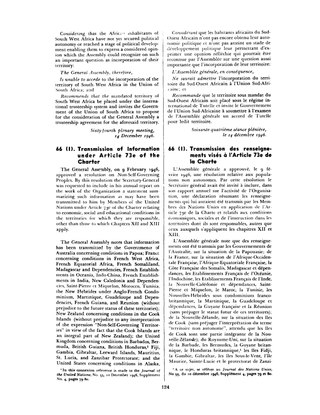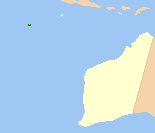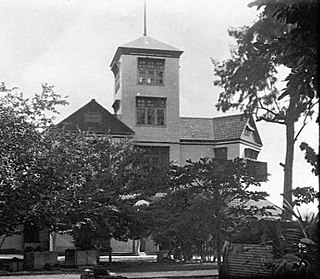
The Cocos (Keeling) Islands, officially the Territory of Cocos (Keeling) Islands, are an Australian external territory in the Indian Ocean, comprising a small archipelago approximately midway between Australia and Sri Lanka and relatively close to the Indonesian island of Sumatra. The territory's dual name reflects that the islands have historically been known as either the Cocos Islands or the Keeling Islands.

Politics of Norfolk Island takes place in a framework of a parliamentary representative democratic entity. Norfolk Island is the only non-mainland Australian territory to have achieved self-governance. The Norfolk Island Act 1979, passed by the Parliament of Australia in 1979, is the Act under which the island is governed.

The right of a people to self-determination is a cardinal principle in modern international law, binding, as such, on the United Nations as authoritative interpretation of the Charter's norms. It states that peoples, based on respect for the principle of equal rights and fair equality of opportunity, have the right to freely choose their sovereignty and international political status with no interference.

The Clunies-Ross family were the original settlers of the Cocos (Keeling) Islands, a small archipelago in the Indian Ocean. From 1827 to 1978, the family ruled the previously uninhabited islands as a private fiefdom, initially as terra nullius and then later under British (1857–1955) and Australian (1955–1978) sovereignty. The head of the family was usually recognised as the resident magistrate, and was sometimes styled as the "King of the Cocos Islands"; a title given by the press.

Chapter XI of the United Nations Charter defines a non-self-governing territory (NSGT) as a territory "whose people have not yet attained a full measure of self-government". In practice, an NSGT is a territory deemed by the United Nations General Assembly (UNGA) to be "non-self-governing". Chapter XI of the UN Charter also includes a "Declaration on Non-Self-Governing Territories" that the interests of the occupants of dependent territories are paramount and requires member states of the United Nations in control of such territories to submit annual information reports concerning the development of those territories. Since 1946, the UNGA has maintained a list of non-self governing territories under member states' control. Since its inception, dozens of territories have been removed from the list, typically when they attained independence or internal self-government, while other territories have been added as new administering countries joined the United Nations or the General Assembly reassessed the status of certain territories.

The states and territories are administrative divisions in Australia, ruled by regional governments that constitute the level of governance between the federal government and local governments. States are self-governing polities with incomplete sovereignty and their own constitutions, legislatures, departments, and certain civil authorities that administer and deliver most public policies and programs. Territories can be autonomous and administer local policies and programs much like the states in practice, but are still constitutionally and financially subordinate to the federal government and thus have no true sovereignty.

The politics of the Sahrawi Arab Democratic Republic refers to politics of the Polisario Front's proclaimed Sahrawi Arab Democratic Republic, a country in North Africa with limited recognition by other states, controlling parts of the Western Sahara region.

An independence referendum is a type of referendum in which the residents of a territory decide whether the territory should become an independent sovereign state. An independence referendum that results in a vote for independence does not always ultimately result in independence.

The Shire of Cocos (Keeling) Islands is a local government area which manages local affairs on the Australian external territory of Cocos (Keeling) Islands. The island is grouped with Western Australia but is administered by the Department of Infrastructure, Regional Development and Cities and an Administrator.
The Supreme Court of the Cocos (Keeling) Islands is the de jure superior court for the Cocos (Keeling) Islands, an Australian external territory. The court was originally established in 1958 after the British Government transferred sovereignty for the islands from Singapore to Australia. The court had jurisdiction to deal with all serious crimes and major civil claims for damages occurring on the Island.
There are six monarchies in Oceania where supreme power resides with an individual hereditary head, who is recognised as the head of state. Each is a constitutional monarchy, wherein the sovereign inherits his or her office, usually keeps it until death or abdication, and is bound by laws and customs in the exercise of their powers. Five of these independent states share King Charles III as their respective head of state, making them part of a global grouping known as the Commonwealth realms; in addition, all monarchies of Oceania are members of the Commonwealth of Nations. The only sovereign monarchy in Oceania that does not share a monarch with another state is Tonga. Australia and New Zealand have dependencies within the region and outside it, although five non-sovereign constituent monarchs are recognized by New Zealand, Papua New Guinea and France.

An independence referendum was held in the Comoros on 22 December 1974. The overall result was a strong "yes" vote, with 94.57% of voters voting for independence and almost all the "no" votes being cast in Mayotte, where there was a majority for remaining under French control. In contrast, on Mohéli only five out of 6,059 votes were against independence. Voter turnout was 93.3%.

The political status of Puerto Rico is that of an unincorporated territory of the United States. As such, the island of Puerto Rico is neither a sovereign nation nor a U.S. state. It is because of that ambiguity, the territory, as a polity, lacks certain rights but enjoys certain benefits that other polities have or lack. For instance, in contrast to U.S. states, Puerto Rico residents cannot vote in U.S. presidential elections nor can they elect their own senators and representatives to the U.S. Congress. On the other hand, in contrast to U.S. states, only some residents of Puerto Rico are subject to federal income taxes. The political status of the island thus stems from how different Puerto Rico is politically from sovereign nations and from U.S. states.
There are differing points of view on whether Puerto Rico's current political status as a territory of the United States should change. Four major viewpoints emerge in principle: that Puerto Rico maintains its current status, becomes a US state, becomes fully independent, or becomes a freely associated state.

Although it is an Australian External Territory, the culture of the Cocos (Keeling) Islands has extensive influences from Malaysia and Indonesia.
The West Island Mosque is a heritage-listed mosque at Alexander Street, West Island, of the Cocos (Keeling) Islands, an external territory of Australia. The mosque was added to the Australian Commonwealth Heritage List on 22 June 2004.
The Home Island Industrial Precinct is a heritage-listed industrial area at Jalan Bunga Mawar, Home Island, Cocos (Keeling) Islands, Australia. It was added to the Australian Commonwealth Heritage List on 22 June 2004.
The Direction Island Slipway and Tank are heritage-listed industrial remnants at Direction Island, Cocos (Keeling) Islands, Australia. The site was added to the Australian Commonwealth Heritage List on 22 June 2004.

Oceania House is a heritage-listed house at Jalan Bunga Kangkong, Home Island, Cocos (Keeling) Islands, Australia. It was added to the Australian Commonwealth Heritage List on 22 June 2004.
The Old Co-op Shop is a heritage-listed retail building at Jalan Bunga Mawar, Home Island, Cocos (Keeling) Islands, Australia. It was added to the Australian Commonwealth Heritage List on 22 June 2004.












